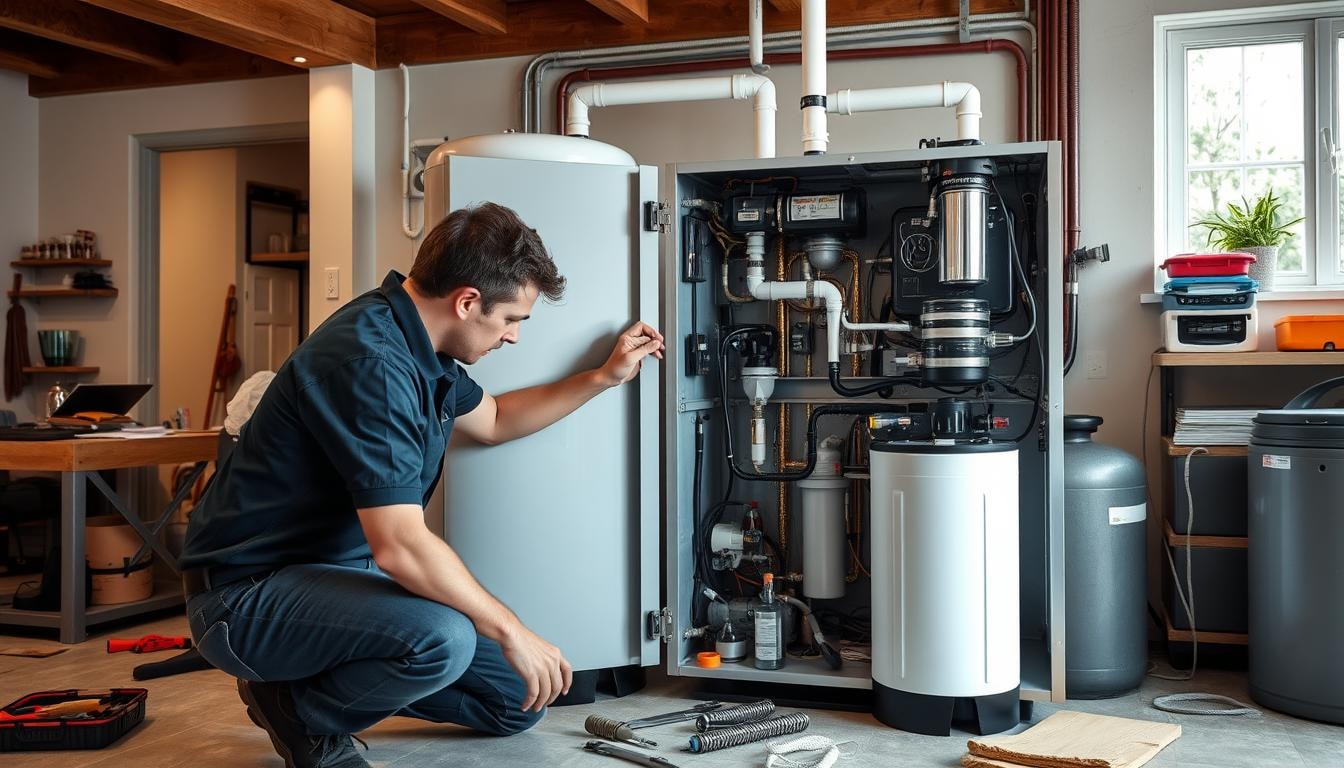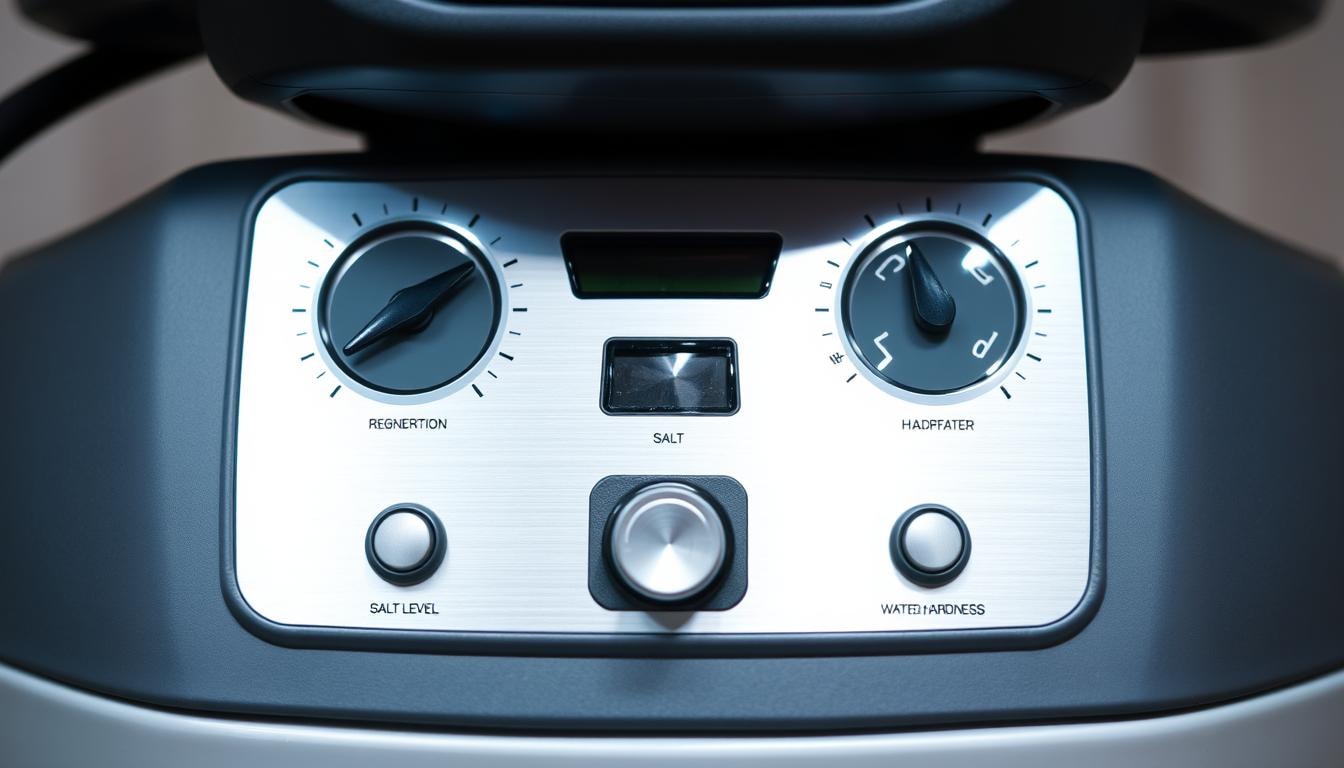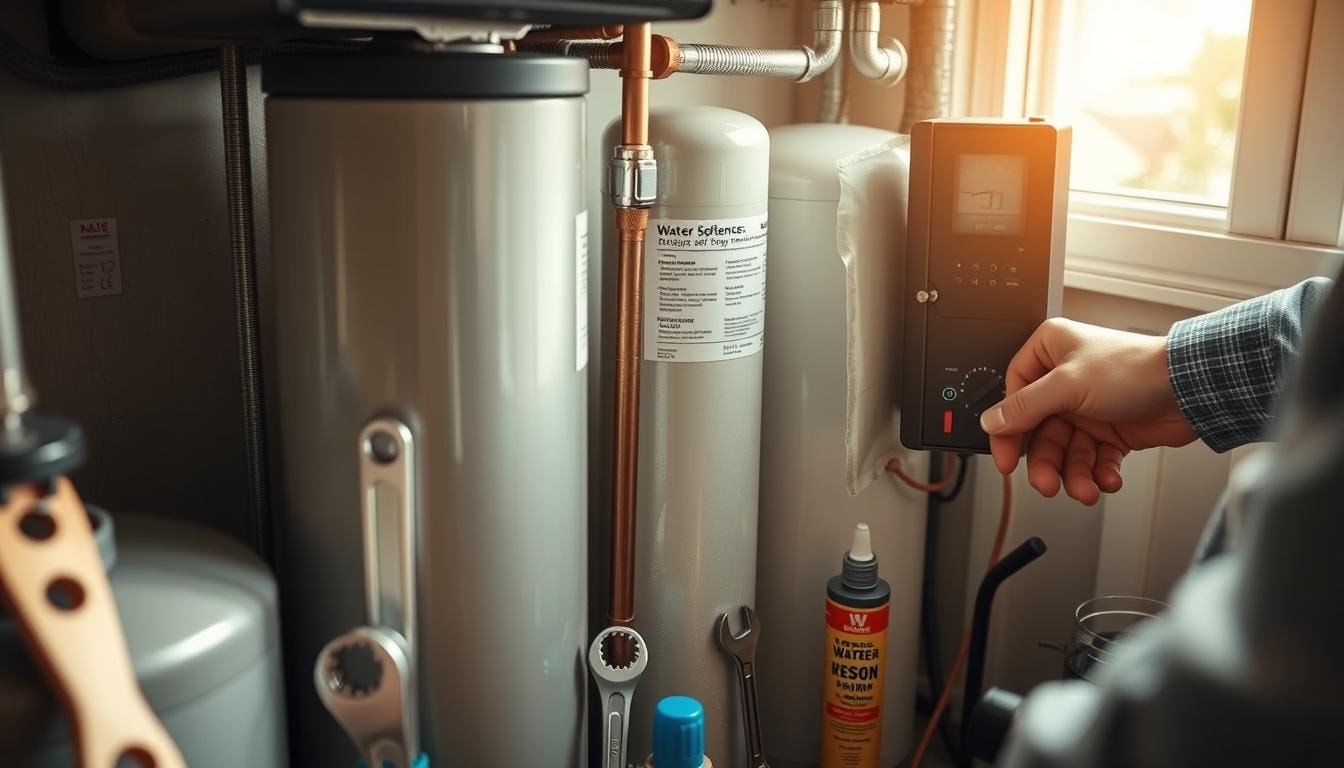Water Softener Repair Near You
Can’t find what you are looking for?
How It Works
-
Answer a few questions about your home project.
-
Within seconds, get matched with top-rated local pros.
-
Compare quotes and choose the best pro for the job.
Water Softener Repair In Your Area
Need Water Softener Repair? Here’s What to Expect

Key Takeaways
- Prompt and efficient service reduces disruptions for customers requiring water softener repairs.
- Transparent pricing and detailed explanations promote honesty and fairness in service provision.
- Satisfaction guarantee assures customers of high-quality service and a commitment to the best possible solutions.
- Regular maintenance is recommended to ensure optimal water softener functionality.
What is a Water Softener?
A water softener removes hard minerals from your home’s water supply. It filters out calcium and magnesium, which can cause problems. These minerals can build up in plumbing, appliances, and on skin and hair.
Installing a water softener brings soft water to your entire home. This can solve many water-related issues. Soft water benefits your plumbing, appliances, and personal care.
Understanding the Basics of Water Softening Systems
Water softeners have two main parts: the main tank and the brine tank. The main tank holds resin beads that trap hard water minerals. This process is called ion exchange.
Soft water then flows to your home’s plumbing and appliances. Over time, resin beads get full of minerals. The brine tank helps clean these beads.
A salt-water solution from the brine tank flushes the main tank. This cleans the resin beads and removes trapped minerals. This cycle keeps the water softener working well.
Water softeners can be single units or two-piece designs. The main tank and brine tank may be separate or together. Both types aim to provide clean, soft water for your home.
Soft water improves how your plumbing and appliances work. It also enhances personal care products. With a water softener, you’ll enjoy these benefits throughout your home.
How Do Water Softeners Work?
Water softeners remove hard minerals from your home’s water supply. This process, called ion exchange, is the key to their function. The main tank contains resin beads coated with sodium ions.
Hard water flows through the tank. The resin beads attract calcium and magnesium ions. They swap these for sodium ions. This softens the water before it enters your plumbing system.
- The hard water enters the main tank, passing through the resin beads.
- The resin beads capture the calcium and magnesium ions, releasing sodium ions in exchange.
- The softened water is then pumped out of the system and into your home’s plumbing.
- Over time, the resin beads become saturated with the hard mineral ions and need to be regenerated.
- During the regeneration cycle, a brine solution from the salt tank is flushed through the main tank, washing away the accumulated minerals and restoring the sodium-coated resin beads.
This process provides your home with soft, mineral-free water. It improves the efficiency of your plumbing system and appliances. Water softeners work continuously to maintain this benefit.
Important Water Softener Settings

Proper water softener settings ensure a steady supply of softened water in your home. Four key settings need attention: regeneration cycle frequency, time, length, and salt dose.
Regeneration Cycle Frequency
The regeneration cycle allows resin beads to swap calcium and magnesium ions for sodium. It’s typically set between one to seven times per week.
This depends on your household’s water usage and hardness level. Adjusting the frequency can optimize your water softener’s performance and efficiency.
Regeneration Cycle Time
Choose a time when water usage is low to minimize disruptions. The cycle usually lasts 30-60 minutes.
This ensures the resin beads are thoroughly cleansed and recharged. Proper timing helps maintain consistent water quality throughout the day.
Regeneration Cycle Length
Set the cycle length according to the manufacturer’s recommendations. Adjust based on your water hardness.
Ensure the cycle is long enough to remove mineral ion buildup. This is crucial for maintaining optimal water softener performance.
Salt Dose
The salt dose is the amount added to the brine tank during regeneration. Configure it based on water hardness and your system’s size.
Adjusting the salt dose maintains the right level of sodium ions. This helps effectively exchange with calcium and magnesium ions in your water.
Monitor and adjust these four settings regularly. This ensures your system operates at peak efficiency, providing reliable soft water.
Regular maintenance can extend your water softener’s lifespan. It also improves your home’s overall water quality.
Water Softener Maintenance
Keeping your water softener in good shape is key for its efficiency. Salt bridges and mushing can cause problems in the brine tank. These issues stop the brine solution from forming properly.
Salt bridges are hard crusts on the tank sides. They separate salt from water. Salt mushing creates a thick sludge at the tank bottom.
Preventing Salt Bridges and Salt Mushing
Check your brine tank often. Break up any salt bridges or mushing you find. Use a cleaning rod or stir with a long object. Make sure your softener is the right size for your home.
Choosing the Right Type of Salt
The salt you use matters. Rock salt has more impurities that can cause issues. Solar and evaporated salts are better choices. These purer salts are less likely to create problems.
Using a Resin Bead Cleaner
Use a resin bead cleaner now and then. It removes buildup on resin beads. This helps keep the system running well.
Cleaning the Venturi Valve
Clean the venturi valve regularly. This valve moves brine solution during regeneration. It can get clogged over time. Cleaning helps it work properly.
These tips will keep your water softener working well. Regular checks are important. Working with a skilled plumber can also help maintain your system.
Benefits of Soft Water
A water softener offers many perks for your home and personal care. Soft water lets your body’s natural oils reach the surface. This results in silky, moisturized skin and hair.
Soft water makes cleaning easier and reduces detergent use. It lathers and rinses more effectively than hard water. You’ll use less dish and laundry soap for the same clean results.
This saves money and helps the environment. It reduces harsh chemicals entering our waterways.
Improved Hair and Skin
Hard water and soap create buildup on hair and skin. This leaves hair brittle and skin tight and dry. Soft water helps cleansing products work better.
Your hair will feel silky. Your skin will feel moisturized and refreshed.
Easier Cleaning and Reduced Detergent Use
Soft water cuts down on mineral buildup on surfaces. It needs less detergent for dishes and laundry. This saves money and helps the environment.
Less mineral content means less soap scum and hard water stains. Your home will be easier to keep clean and sparkling.
Routine Maintenance Checks

Your water softener needs regular upkeep to work its best. Check and refill the salt in the brine tank every 2-4 months. Clean the brine tank every few years to remove sediment buildup.
If your water is unsafe to drink, sanitize the softener. The bypass function lets you skip softening for lawn watering or pool filling. These checks will extend your softener’s life and ensure high-quality soft water.
- Check and refill salt in the brine tank every 2-4 months
- Clean the brine tank every few years to remove sediment
- Sanitize the water softener if the water is unsafe for consumption
- Utilize the bypass function when needed to avoid softening water for certain uses
Regular maintenance keeps your water softener running smoothly. It helps your softener last longer and maintains high water quality. Your home, appliances, and outdoor areas will benefit from consistent soft water.
Signs of a Failing Water Softener
Your water softener might be failing if you spot certain signs. Catching these issues early can prevent a complete system breakdown. Let’s explore some key indicators to watch for.
Soap not lathering well is a major red flag. Hard water creates soap scum on shower surfaces. You may see spots on dishes and mineral stains on clothes.
Water taste changes can signal problems too. Clothes might feel stiff after washing. Watch for unusually frequent system regeneration cycles.
Stay alert to these signs. Quick action keeps your water quality high. It also helps your plumbing system work well.
When to Call a Professional
For major water softener maintenance or repairs, it’s best to call a professional. This includes brine tank cleaning, resin bed replacement, and full system sanitization. Attempting these complex tasks without expertise can damage the equipment.
A professional plumber can guide you on installing and setting up a new water softener. Their expertise ensures your system runs efficiently from the start. Relying on an expert guarantees the longevity of your water softening system.
Common issues that may require a professional include:
- Clogged or malfunctioning control valves
- Faulty timers or regeneration cycles
- Resin bed replacement due to mineral saturation
- Recurring salt bridging or mushing in the brine tank
- Declining water softener efficiency leading to hard water issues
Trying to fix these problems without proper knowledge can cause more harm. It may lead to ineffective maintenance of your system. A professional ensures your water softener works well for years.
Tips for Finding the Best Water Softener Repair Professional
Finding a qualified water softener repair professional is crucial. Look for a licensed, insured company with a proven track record. Check online reviews to assess their customer service and workmanship.
Here are some tips to help you find the best repair expert:
- Seek out a company with extensive experience in all types of water treatment systems. This ensures they can diagnose and fix your specific issue effectively.
- Ask about warranties or guarantees on parts and labor. A reputable provider will stand behind their work confidently.
- Get quotes from multiple repair providers to compare costs. Be cautious of unusually low prices.
- Confirm the company services your area and can respond quickly. Prompt, local service is key to fixing your system fast.
Finding a skilled repair professional ensures your water softener is in good hands. The right expert will restore your system to peak performance.
Finding the Best Water Softener Pros with FindPros
Having trouble with your water softener? Looking to install a new unit? FindPros can help. Simply answer a few questions about your home’s water issues and needs, and we’ll match you with top-rated local professionals who can provide the best solutions. Get competitive quotes, compare services, and choose the pro that’s the perfect fit.
FindPros connects you with skilled experts who can ensure your resin tank, plumbing fixtures, and hot water system are working efficiently, delivering the softer water you deserve. Stop worrying about mineral deposits, poor water flow, or higher water bills. Let FindPros help you find the right water softener pro to extend the life of your unit and keep your home’s water quality top-notch.
Conclusion
A well-functioning water softener offers many perks for homeowners. It provides silky smooth hair and skin. It also reduces mineral buildup in plumbing and appliances. However, water softeners need regular maintenance and occasional repairs.
Proper system care helps your water softener deliver high-quality water. Recognizing issue signs and hiring the right pro is crucial. This ensures your system works well for years to come.
Good care and timely repairs lead to lower bills and longer-lasting appliances. They also improve your quality of life. Regular maintenance prevents common issues and extends system life.
Professional water softener services have the know-how to fix complex problems. Addressing concerns quickly lets you enjoy soft water benefits. Your home and family will thank you for it.
Frequently Asked Questions (Water Softener Repair)
MOST POPULAR CITIES
Browse by State- Alameda
- Costa Mesa
- Laguna Beach
- Orange
- Alhambra
- Culver City
- Lancaster
- Oroville
- Anaheim
- Daly City
- Livermore
- Oxnard
- Antioch
- Davis
- Lodi
- Pacific Grove
- Arcadia
- Downey
- Lompoc
- Palm Springs
- Bakersfield
- El Centro
- Long Beach
- Palmdale
- Barstow
- El Cerrito
- Los Angeles
- Palo Alto
- Belmont
- El Monte
- Malibu
- Pasadena
- Berkeley
- Escondido
- Martinez
- Petaluma
- Beverly Hills
- Eureka
- Marysville
- Pomona
- Brea
- Fairfield
- Menlo Park
- Port Hueneme
- Buena Park
- Fontana
- Merced
- Rancho Cucamonga
- Burbank
- Fremont
- Modesto
- Red Bluff
- Calexico
- Fresno
- Monterey
- Redding
- Calistoga
- Fullerton
- Mountain View
- Redlands
- Carlsbad
- Garden Grove
- Napa
- Redondo Beach
- Carmel
- Glendale
- Needles
- Redwood City
- Chico
- Hayward
- Newport Beach
- Richmond
- Chula Vista
- Hollywood
- Norwalk
- Riverside
- Claremont
- Huntington Beach
- Novato
- Roseville
- Compton
- Indio
- Oakland
- Sacramento
- Concord
- Inglewood
- Oceanside
- Salinas
- Corona
- Irvine
- Ojai
- San Bernardino
- Coronado
- La Habra
- Ontario
- San Clemente